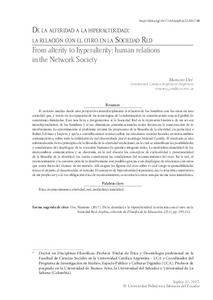Por favor, use este identificador para citar o enlazar este ítem:
https://repositorio.uca.edu.ar/handle/123456789/16967| Título: | De la alteridad a la hiperalteridad : la relación con el otro en la Sociedad Red From alterity to hyperalterity : human relations in the Network Society |
Autor: | Ure, Mariano | Palabras clave: | ETICA; ALTERIDAD; TECNOLOGIA DE LA INFORMACION; REDES SOCIALES | Fecha de publicación: | 2017 | Editorial: | Universidad Politécnica Salesiana del Ecuador | Cita: | Ure, M. De la alteridad a la hiperalteridad : la relación con el otro en la Sociedad Red [en línea]. Sophia, Colección de Filosofía de la Educación. 2017, 22. doi: 10.17163/soph.n22.2017.08. Disponible en: https://repositorio.uca.edu.ar/handle/123456789/16967 | Resumen: | Resumen:
El artículo analiza desde una perspectiva interdisciplinaria la relación de los hombres con los otros en una
sociedad que, a través de la expansión de las tecnologías de la información, va constituyendo una red global de
conexiones ilimitadas. Esto nos lleva a preguntarnos si la Sociedad Red es la expresión histórica de un ser-así
interdependientes de los hombres y si sus dinámicas comunicacionales reales favorecen la construcción de lo
interhumano. La aproximación al problema retoma las propuestas de la filosofía de la alteridad, en particular a
Buber, Lévinas y Jaspers, y apela a contribuciones teóricas sobre las relaciones sociales basadas en intercambios
comunicativos, sobre todo la definición de red desarrollada por el sociólogo Manuel Castells. El resultado es una
reformulación de los principios de la filosofía de la alteridad tradicional, en la cual se identifican las posibilidades
y condiciones del despliegue de la vocación humana de quienes integran redes. La multidireccionalidad de los
intercambios comunicativos y su diacronía en la red discute los conceptos de exclusividad y presencialidad
de la filosofía de la alteridad, los cuales constituyen las condiciones del reconocimiento del otro. En la red, el
reconocimiento y la construcción de lo interhumano son posibles gracias a un despliegue de relaciones con otros
que están fuera del alcance de mi mirada. Allí surgen las figuras del otro sobre el cual tengo responsabilidades
éticas: el alejado, el desconocido, el extraño. El concepto de hiperalteridad representa, así, la relación, constitutiva
de mi propio ser y a la vez obligación ética de reconocimiento, con todos los otros aunque no me sean inmediatos. Abstract: From an interdisciplinary perspective, this article analyzes the relationship between men in a society that, through the expansion of information technology, is building a global network of unlimited connections. This leads us to wonder if the Network Society is the historical expression of a mode of being interdependent and if its real communicational dynamics promote the construction of the inter-human dimension. The approach to the problem takes up the proposals of the philosophy of alterity, particularly those from Buber, Lévinas and Jaspers, and appeals to theoretical contributions on the social relations based on communicative exchanges, specially the definition of network developed by the sociologist Manuel Catells. The result is a reformulation of the principles of the traditional philosophy of alterity, in which are identified the possibilities and conditions for the deployment of the human vocation of those who integrate networks. The multidirectionality of communicative exchanges and their diachrony in the network discusses the concepts of exclusivity and presence of the philosophy of alterity, which constitute the conditions of recognition of the other. In the network, the recognition and construction of the interhuman are possible thanks to a deployment of relationships with others that are beyond the reach of my gaze. Thus emerge the figures of the other on whom I have ethical responsibilities: the remote, the unknown and the stranger. The concept of hyperalterity represents the relationship, constitutive of my own being and at the same time an ethical obligation of recognition, with all the others even if they are not immediate for me. |
URI: | https://repositorio.uca.edu.ar/handle/123456789/16967 | ISSN: | 1390-3861 (impreso) 1390-8626 (online) |
Disciplina: | CIENCIAS SOCIALES | DOI: | 10.17163/soph.n22.2017.08 | Derechos: | Acceso abierto | Fuente: | Sophia, Colección de Filosofía de la Educación. No.22, 2017 |
| Aparece en las colecciones: | Artículos |
Ficheros en este ítem:
| Fichero | Descripción | Tamaño | Formato | |
|---|---|---|---|---|
| alteridad-hiperalteridad-relacion.pdf | 160,92 kB | Adobe PDF |  Visualizar/Abrir |
Visualizaciones de página(s)
27
comprobado en 27-abr-2024
Descarga(s)
14
comprobado en 27-abr-2024
Google ScholarTM
Ver en Google Scholar
Altmetric
Altmetric
Este ítem está sujeto a una Licencia Creative Commons

